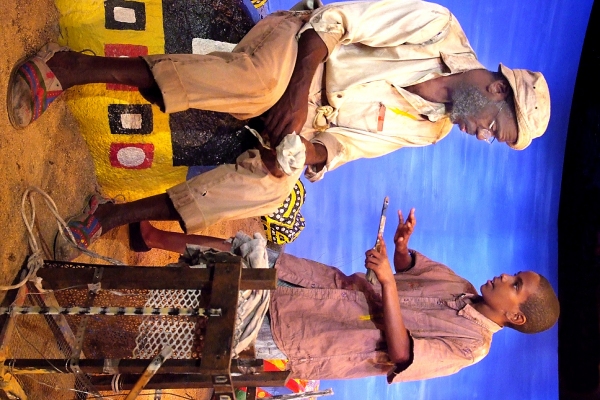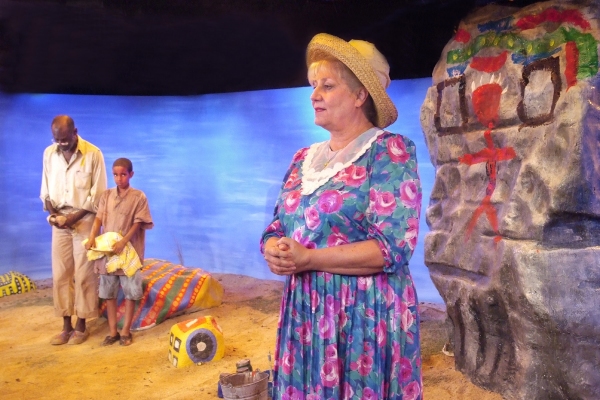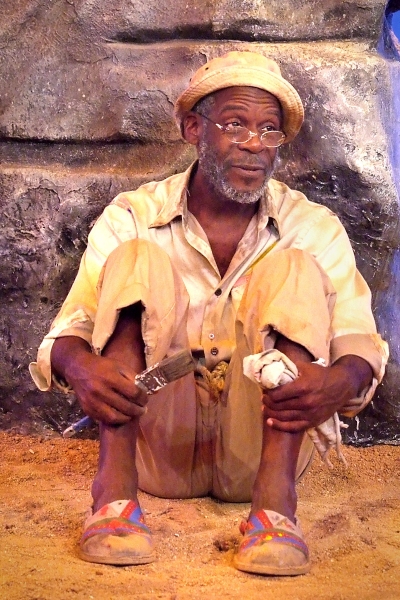The Fountain Theatrecontinues its 15-year relationship with master playwright Athol Fugard, presenting the West Coast premiere of his newest play. Directed by Simon Levy, The Painted Rocks at Revolver Creek opens on November 7 at the Fountain Theatre in Hollywood.
Both Fugard and the Fountain come full circle with
Painted Rocks, a play inspired by the work of real-life outsider artist Nukain Mabuza. In 1972, a personal encounter with outsider artist
Helen Martins, a reclusive and ostracized figure in a small, ultra-conservative Afrikaans community who had created an extraordinary collection of statues in her back yard, led to Fugard's celebrated play,
The Road to Mecca. And it was the Fountain's Los Angeles premiere of that play in 2000, directed by Fountain co-artistic director
Stephen Sachs, that introduced the playwright to the theater he would come to call his "artistic home on the West Coast."
"Forty years later [after my encounter with
Helen Martins], I became aware of another outsider artist worthy of the same attention, working in completely different circumstances and also with a different medium," wrote Fugard on the website of South Africa's Stellenbosch Institute for Advanced Studies, where he is currently an artist-in-residence. "The environment of present-day South Africa made me realize the true potential of Nukain's story, and that, even though he worked on the fringes, it can in fact not be fully realized without taking on the realities of his existence in apartheid South Africa."
In the play
, the aging Nukain (
Thomas Silcott) has spent his life transforming the rocks at Revolver Creek into a vibrant garden of painted flowers. Faced with the presence of the final unpainted rock - and at the insistence of his young companion, Bokkie (
Philip Solomon) - he is forced to confront his legacy as an artist and a black man in 1980s South Africa. When the landowner's wife (Suanne Spoke) arrives to demand he stop painting, the deep racial conflict of the country is viscerally exposed. Twenty years later, in what has become the new South Africa, the man called Bokkie as a child (
Gilbert Glenn Brown) returns to restore Mabuza's lifework.
"Possibly, at this moment in our history, the stories that need telling are more urgent than any of the stories that needed telling during the apartheid years," Fugard said in an interview with NPR.
"At the heart of Athol's beautiful new play is the issue of seeing and being seen - as an artist, as a man, especially as a black man," says Levy. "It's an on-going, universal problem that Athol has spent his life exploring and exposing and humanizing. To be seen for who you really are, and to be loved and honored for that. It's a beautiful message, and one we need to hear over and over again."
The author of over 30 plays and recipient of countless accolades including an Academy Award, Obie and the 2011 Special Tony Award for Lifetime in the Theatre,
Athol Fugard is best known for his plays about the frustrations of life in contemporary South Africa and the psychological barriers created by apartheid. Widely acclaimed around the world, his plays include
Boesman and Lena (Obie Award, Best Foreign Play),
Sizwe Bansi Is Dead (Tony Award, Best Play),
A Lesson from Aloes (New York Drama Critics Circle Award, Best Play), the semiautobiographical
Master Harold...and the Boys (Writers Guild Award, Outstanding Achievement) and
The Road to Mecca (New York Drama Critics Circle Citation, Best Foreign Play, London Evening Standard Award, Best Play). The first white South African playwright to collaborate with black actors and workers, some of his works, such as
Blood Knot, were initially banned in South Africa. In his first two post-apartheid plays,
Valley Song (1995) and
The Captain's Tiger (1998), Fugard addressed more personal concerns, but in
Sorrows and Rejoicings (2001) he focused on the complex racial dynamics of South Africa's new era. In 2005 his novel,
Tsotsi (1980), was adapted for the screen, winning the Academy Award for Best Foreign Language Film.
When Fugard saw the Fountain's Los Angeles premiere of
The Road to Mecca in 2000, he was so impressed that he offered the company world premiere rights to an as-yet-unwritten new work. In 2004,
Stephen Sachs directed the world premiere of
Exits and Entrances. The production garnered production and direction awards from both the Los Angeles Drama Critics Circle and the Ovations, and Sachs went on to direct acclaimed regional productions around the country, including an off-Broadway production at
Primary Stages and the UK premiere at the 2007 International Edinburgh Festival. Since then, the Fountain has produced four premieres of Fugard's plays including the American premiere of
Victory (two LADCC awards and four
LA Weekly nominations, and named "Best of 2008" by the
Los Angeles Times); the West Coast premiere of
Coming Home (three
LA Weekly awards including "Ensemble" and "Direction," LADCC award for "Lead Performance")
; the U.S. premiere of
The Train Driver (three
LA Weeklyawards); and the U.S. premiere of
The Blue Iris (LA Weekly Award nomination for best ensemble)
.
The Painted Rocks at Revolver Creek premiered to critical acclaim at the
Signature Theatre in New York City earlier this year.
The New York Times called it "tender and ruminative" and
Newsday wrote, "Fugard stamps indelible human faces on faraway reports of the world's news."
Set design for the Fountain Theatre production of
The Painted Rocks at Revolver Creek is by Jeffrey McLaughlin; lighting design is by
Jennifer Edwards; sound design is by Peter Bayne; costume design is by
Naila Aladdin Sanders; props are by Dillon Nelson; dialect coach is
Nike Doukas; assistant stage manager is Terri Roberts; production stage manager is Rita Cofield; associate producer is James Bennett; and
Stephen Sachs and
Deborah Lawlor produce for the Fountain Theatre.
Currently celebrating its 25th anniversary, The Fountain Theatre is one of the most successful intimate theaters in Los Angeles, providing a creative home for multi-ethnic theater and dance artists. The Fountain has won over 225 awards, and Fountain projects have been seen across the U.S. and internationally. Recent highlights include being honored with the 2014 Ovation Award for Best Season and the 2014 BEST Award for overall excellence from the Biller Foundation; the Fountain play
Bakersfield Mist in London's West End starring
Kathleen Turner and
Ian McDiarmid; the sold-out
Forever Flamenco gala concert at the 1200-seat John Anson Ford Amphitheatre; and the last six Fountain productions consecutively highlighted as Critic's Choice in the
Los Angeles Times. The Fountain has been honored with six Awards of Excellence from the Los Angeles City Council for "enhancing the cultural life of Los Angeles."
The Painted Rocks at Revolver Creek opens on Saturday, Nov. 7 and continues through Dec. 14, with performances Fridays and Saturdays at 8 p.m.; Sundays at 3 p.m. and 7 p.m.; and Mondays at 8 p.m. (On Sunday, Nov. 8, one performance only, at 3 p.m.) Four preview performances take place on Friday, Oct. 30 at 8 p,m.; Sunday, Nov. 1 at 3 p.m. Thursday, Nov. 5 at 8 p.m.; and Friday, Nov. 6 at 8 p.m. Tickets range from Pay-What-You-Can at every Monday performance to $15-$34.95 on the weekends. The Fountain Theatre is located at 5060 Fountain Avenue (at Normandie) in Los Angeles. Secure, on-site parking is available for $5. The Fountain Theatre is air-conditioned and wheelchair accessible. For reservations and information, call
(323) 663-1525 or go to
www.FountainTheatre.com.
Photos: Ed Krieger
Comments
To post a comment, you must
register and
login.








